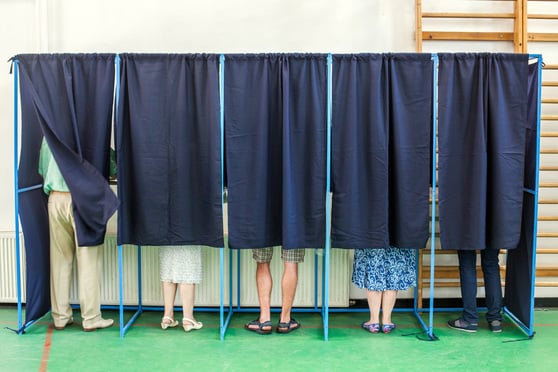William Josephson

January 04, 2019 | New York Law Journal
17 Reasons Why the National Popular Vote Initiative Is Likely to FailLegal scholars have argued that NPV violates sections two and five of the 1965 Voting Rights Act and Equal Protection under the Fourteenth Amendment.
By William Josephson
6 minute read
October 07, 2013 | New York Law Journal
Amending the Not-for-Profit Corporation Law: the Next StepsPeter J. Kiernan, Rose Mary Bailly and William Josephson from the New York State Law Revision Commission discuss pending amendments involving the Estates, Powers and Trusts Law, indemnification revision, audit oversight and the disparities between the NPCL's regulatory provisions and those also made applicable by the Internal Revenue Code to publicly supported charities and private foundations.
By Peter J. Kiernan, Rose Mary Bailly and William Josephson
12 minute read
July 23, 2013 | New York Law Journal
Amending the Not-for-Profit Corporation Law—the BeginningPeter J. Kiernan and Rose Mary Bailly of the New York State Law Revision Commission, and William Josephson, who acted pro bono as a consultant to the Commission, write that the first major NPCL revision in more than 40 years, passed in the closing hours of the 2013-2014 Legislative Regular Session, contains significant changes for the over 100,000 not-for-profit corporations in New York.
By Peter J. Kiernan, Rose Mary Bailly and William Josephson
17 minute read

December 30, 2004 | New York Law Journal
Not-for-Profit, Religious Corporations Laws Special Act Corporations, Part IWilliam Josephson, retired from Fried, Frank, Harris, Shriver & Jacobson, writes that, in the 19th century, and well into the 20th, the New York State Legislature often enacted special acts creating corporations.
By William Josephson
10 minute read

January 07, 2005 | New York Law Journal
Laws on Not-for-Profits, Religious Firms, Special Act Firms: Part 2William Josephson, who retired from Fried, Frank, Harris, Shriver & Jacobson after 30 years as a partner, analyzes legal issues surrounding the status of The National Council of Young Israel, created in 1926 by special act, 1926 N.Y. Laws chapter 680.
By William Josephson
13 minute read

March 30, 2010 | New York Law Journal
Bills Addressing Charitable Investments Impair Donors' RightsWilliam Josephson, a retired partner of Fried Frank Harris Shriver & Jacobson and head of Attorney General Eliot Spitzer's Charities Bureau from 1999 to 2004, expresses comncerns about pending legislation that would continue an unfortunate trend to shield further charitable fiduciaries from liability for their reinvestment decisions.
By William Josephson
7 minute read

June 11, 2009 | New York Law Journal
Uniform 'Imprudent' Management Of Institutional Funds ActWilliam Josephson, a retired partner of Fried Frank Harris Shriver & Jacobson who headed Attorney General Eliot Spitzer's Charities Bureau from 1999 to 2004, writes that Senator Liz Krueger and Assemblyman Jonathan L. Bing have introduced in the State Legislature S4778 and A7907, respectively, the so-called Uniform Prudent Management of Institutional Funds Act, as a new article of the Not-for-Profit Corporation Law. These bills, he cautions, continue an unfortunate trend that must be stopped if we are to avoid future Madoff scandals in the philanthropic world.
By William Josephson
7 minute read

June 09, 2004 | New York Law Journal
Charitable Fund-Raising Developments After 'Madigan'William Josephson, the assistant attorney general-in-charge of the Charities Bureau in the Office of the New York State Attorney General, reviews a Supreme Court decision involving the tangled relationships that can arise between telemarketers and charities.
By William Josephson
7 minute read

December 03, 2010 | New York Law Journal
New Prudent Management Of Institutional Funds ActWilliam Josephson, a retired partner at Fried, Frank, Harris, Shriver & Jacobson and the assistant attorney general-in-charge of the Charities Bureau from 1999-2004, writes that because of the severe economic turndown, the Legislature was subjected to strong professional lobbying by institutions that feared their endowments might become less than their historic dollar value, while, as a practical matter, no one represents the interests of donors.
By William Josephson
13 minute read
Trending Stories
- 1Gibson Dunn Sued By Crypto Client After Lateral Hire Causes Conflict of Interest
- 2Trump's Solicitor General Expected to 'Flip' Prelogar's Positions at Supreme Court
- 3Pharmacy Lawyers See Promise in NY Regulator's Curbs on PBM Industry
- 4Outgoing USPTO Director Kathi Vidal: ‘We All Want the Country to Be in a Better Place’
- 5Supreme Court Will Review Constitutionality Of FCC's Universal Service Fund
More from ALM
- Legal Speak at General Counsel Conference East 2024: Match Group's Katie Dugan & Herrick's Carol Goodman 1 minute read
- Legal Speak at General Counsel Conference East 2024: Eric Wall, Executive VP, Syllo 1 minute read
- Legal Speak at General Counsel Conference East 2024: Virginia Griffith, Director of Business Development at OutsideGC 1 minute read



